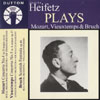Heifetz plays Bruch, Mozart & Vieuxtemps
Heifetz, the complete violinist here, is spontaneously graceful and charming in Mozart, and brings genuine feeling to Bruch and extraordinary virtuosity to Vieuxtemps
View record and artist detailsRecord and Artist Details
Label: Dutton Laboratories
Magazine Review Date: 1/2001
Media Format: CD or Download
Media Runtime: 0
Mastering:
ADD
Catalogue Number: CDBP9704

Author: Joan Chissell
Anyone like myself, far too long out of touch with the innumerable Heifetz reissues of recent years, may find themselves as bowled over as I was throughout this new bargain-price trilogy, recorded in the autumn of 1947 when he was 46 – the Bruch for RCA in Hollywood, and soon after the Mozart and Vieuxtemps for EMI here in Abbey Road’s legendary Studio No 1.
With Beecham as a like-minded accomplice, the Mozart delighted me with its spontaneous grace and charm, its reminders of a bygone age when instrumental music was more often designed for courtly entertainment than soul-searching edification. I’m sure the 19-year-old Mozart (no mean violinist himself) would have loved it – even the fastish tempo chosen for the Allegro ma non troppo finale.
Virtuosity is, of course, the prime essential for Vieuxtemps, whose own in the 19th century was as phenomenal as Heifetz’s in the 20th. Here the LSO, under Sargent, emerges more sharply focused in sound quality than the RPO in Mozart, with the soloist rightly more forwardly placed so that his tone can be relished to the full throughout its exceptionally wide range of colour and dynamics.
The intensity of his lyrical yearning here is as haunting as his brilliance, the double-stopping at times making it difficult to believe that such clearly differentiated strands could all have come from a single instrument. In sum, he persuaded me that both this work and Bruch’s Scottish folksong-inspired Fantasia (where the RCA Victor Orchestra and Steinberg give him closely attuned support) grew from deeper personal feeling than is often thought. High marks to Dutton’s engineers for such pleasing transfers.'
With Beecham as a like-minded accomplice, the Mozart delighted me with its spontaneous grace and charm, its reminders of a bygone age when instrumental music was more often designed for courtly entertainment than soul-searching edification. I’m sure the 19-year-old Mozart (no mean violinist himself) would have loved it – even the fastish tempo chosen for the Allegro ma non troppo finale.
Virtuosity is, of course, the prime essential for Vieuxtemps, whose own in the 19th century was as phenomenal as Heifetz’s in the 20th. Here the LSO, under Sargent, emerges more sharply focused in sound quality than the RPO in Mozart, with the soloist rightly more forwardly placed so that his tone can be relished to the full throughout its exceptionally wide range of colour and dynamics.
The intensity of his lyrical yearning here is as haunting as his brilliance, the double-stopping at times making it difficult to believe that such clearly differentiated strands could all have come from a single instrument. In sum, he persuaded me that both this work and Bruch’s Scottish folksong-inspired Fantasia (where the RCA Victor Orchestra and Steinberg give him closely attuned support) grew from deeper personal feeling than is often thought. High marks to Dutton’s engineers for such pleasing transfers.'
Discover the world's largest classical music catalogue with Presto Music.

Gramophone Digital Club
- Digital Edition
- Digital Archive
- Reviews Database
- Full website access
From £8.75 / month
Subscribe
Gramophone Full Club
- Print Edition
- Digital Edition
- Digital Archive
- Reviews Database
- Full website access
From £11.00 / month
Subscribe
If you are a library, university or other organisation that would be interested in an institutional subscription to Gramophone please click here for further information.




